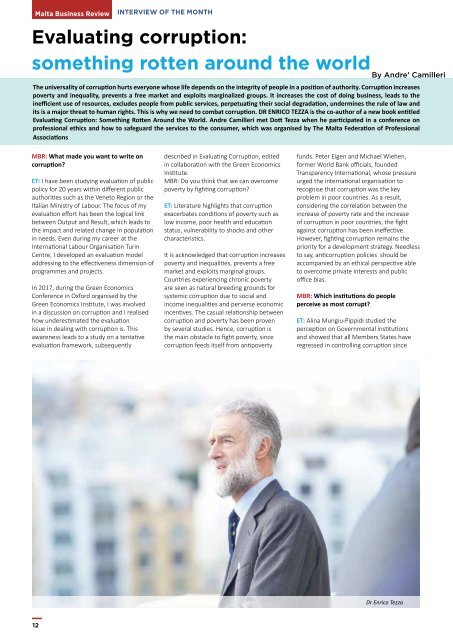MBR_ISSUE 47_JAN_LR
You also want an ePaper? Increase the reach of your titles
YUMPU automatically turns print PDFs into web optimized ePapers that Google loves.
Malta Business Review<br />
INTERVIEW OF THE MONTH<br />
Evaluating corruption:<br />
something rotten around the world<br />
By Andre’ Camilleri<br />
The universality of corruption hurts everyone whose life depends on the integrity of people in a position of authority. Corruption increases<br />
poverty and inequality, prevents a free market and exploits marginalized groups. It increases the cost of doing business, leads to the<br />
inefficient use of resources, excludes people from public services, perpetuating their social degradation, undermines the rule of law and<br />
its is a major threat to human rights. This is why we need to combat corruption. DR ENRICO TEZZA is the co-author of a new book entitled<br />
Evaluating Corruption: Something Rotten Around the World. Andre Camilleri met Dott Tezza when he participated in a conference on<br />
professional ethics and how to safeguard the services to the consumer, which was organised by The Malta Federation of Professional<br />
Associations<br />
<strong>MBR</strong>: What made you want to write on<br />
corruption?<br />
ET: I have been studying evaluation of public<br />
policy for 20 years within different public<br />
authorities such as the Veneto Region or the<br />
Italian Ministry of Labour. The focus of my<br />
evaluation effort has been the logical link<br />
between Output and Result, which leads to<br />
the impact and related change in population<br />
in needs. Even during my career at the<br />
International Labour Organisation Turin<br />
Centre, I developed an evaluation model<br />
addressing to the effectiveness dimension of<br />
programmes and projects.<br />
In 2017, during the Green Economics<br />
Conference in Oxford organised by the<br />
Green Economics Institute, I was involved<br />
in a discussion on corruption and I realised<br />
how underestimated the evaluation<br />
issue in dealing with corruption is. This<br />
awareness leads to a study on a tentative<br />
evaluation framework, subsequently<br />
described in Evaluating Corruption, edited<br />
in collaboration with the Green Economics<br />
Institute.<br />
<strong>MBR</strong>: Do you think that we can overcome<br />
poverty by fighting corruption?<br />
ET: Literature highlights that corruption<br />
exacerbates conditions of poverty such as<br />
low income, poor health and education<br />
status, vulnerability to shocks and other<br />
characteristics.<br />
It is acknowledged that corruption increases<br />
poverty and inequalities, prevents a free<br />
market and exploits marginal groups.<br />
Countries experiencing chronic poverty<br />
are seen as natural breeding grounds for<br />
systemic corruption due to social and<br />
income inequalities and perverse economic<br />
incentives. The casual relationship between<br />
corruption and poverty has been proven<br />
by several studies. Hence, corruption is<br />
the main obstacle to fight poverty, since<br />
corruption feeds itself from antipoverty<br />
funds. Peter Eigen and Michael Wiehen,<br />
former World Bank officials, founded<br />
Transparency International, whose pressure<br />
urged the international organisation to<br />
recognise that corruption was the key<br />
problem in poor countries. As a result,<br />
considering the correlation between the<br />
increase of poverty rate and the increase<br />
of corruption in poor countries, the fight<br />
against corruption has been ineffective.<br />
However, fighting corruption remains the<br />
priority for a development strategy. Needless<br />
to say, anticorruption policies should be<br />
accompanied by an ethical perspective able<br />
to overcome private interests and public<br />
office bias.<br />
<strong>MBR</strong>: Which institutions do people<br />
perceive as most corrupt?<br />
ET: Alina Mungiu-Pippidi studied the<br />
perception on Governmental institutions<br />
and showed that all Members States have<br />
regressed in controlling corruption since<br />
Dr Enrico Tezza<br />
12
















